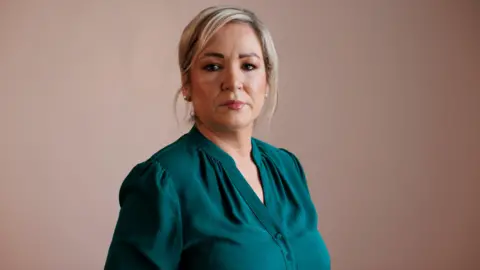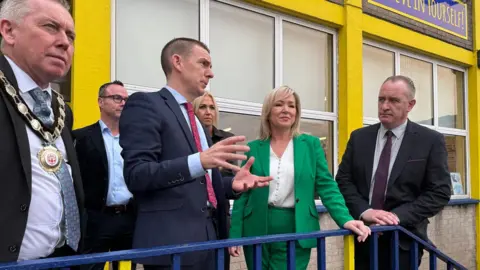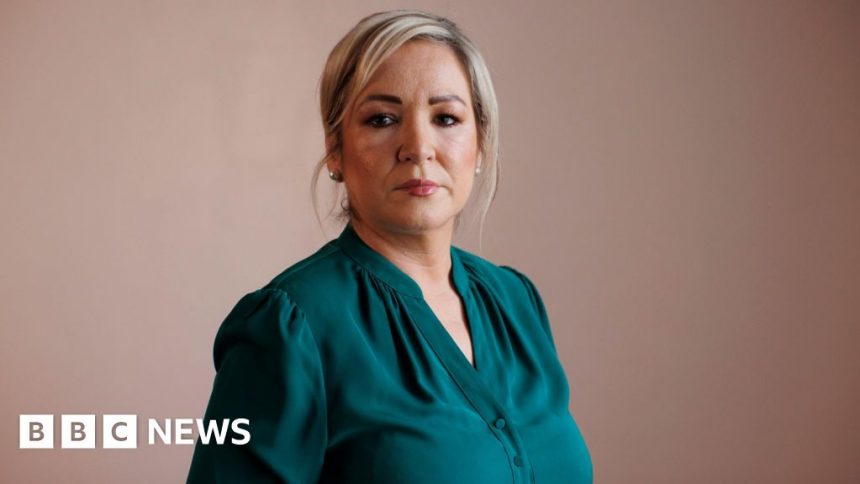O’Neill ‘understands’ hurt over Remembrance Sunday event
 Liam McBurney/PA Wire
Liam McBurney/PA WireMichelle O’Neill has said she understands why some people may feel hurt by her attendance at a Remembrance Sunday event this weekend.
The first minister is to become the first senior Sinn Féin figure to take part in an official Remembrance Sunday ceremony in Belfast.
In a letter published in The Irish News more than 100 relatives of victims of the Troubles from the Republican community in County Tyrone hit out at her decision.
The letter said they felt “deeply hurt, frustrated and angry”.
O’Neill said she “understands that some people will have difficulty” with her attendance but she is “committed to be a first minister for all”.
‘Devastating’ for families

She was speaking during a visit to a primary school in Magherafelt.
The letter accused the first minister of “populism” and said Sinn Féin had “turned political somersaults into an Olympic sport”.
‘This is about leadership’
“I want to live up to the pledge that I made to represent everybody here in society,” O’Neill said in response to the criticism.
She added that she will attend on Sunday but “absolutely understands” that people will feel hurt, “because there is nothing to celebrate in the horror of war”.
“Many people will have lost loved ones and will feel that very dearly, so I absolutely understand where anybody is coming from but for me this is about leadership in terms of my role as first minister for all the people that live here.”
‘Disappointed but not surprised’
Seana Quinn and Angela McKearney are two of those who signed the letter.
They lost family members in incidents they believe involved collusion between paramilitaries and security forces.
Speaking to Radio Ulster’s Evening Extra programme, they said the First Minister’s decision left them “extremely disappointed.”
Seana, who lost her brother in 1991, told the programme she believes “Sinn Féin are acknowledging British war crimes, we as a family are still very much hurting and the British government have refused to acknowledge the wrongdoings in the loss of my loved ones.”
She added: “I felt so much hurt. I was so disappointed, we have been fighting for justice for the death of my brother who was killed at 17 years of age.
“This language and terminology is used as an excuse to endorse the crown forces and to normalise their presence in our country.”
Angela, who lost both her uncle and brother in 1992, said she was “disappointed but not surprised, given Sinn Fein members over the years have met and greeted with the commander-in-chief of the British police and military.”
She added: “If she is a first minister for all, I’m included in that.”
More than 20 years have passed since Alex Maskey became the first Sinn Féin lord mayor to pay his respects to the war dead at the Cenotaph at Belfast City Hall.
On 1 July 2002 he laid a laurel wreath at the monument, two hours ahead of the main council ceremony to commemorate the anniversary of the Battle of the Somme.
Maskey described his gesture as a “major step for republicans and nationalists on this island”.
However, he would not attend the main ceremony that year, refusing to take part in a “military commemoration” of the World War One battle.
Since then, Sinn Féin politicians have always declined to attend Cenotaph wreath laying ceremonies in any official capacity.
In the years that have passed, there have been other firsts and many other gestures in a bid to promote reconciliation and good relations.
In 2016, the late Martin McGuinness travelled to France and Belgium as part of a two-day trip to World War One battlefields.
He laid wreaths at the sites where the Somme and the Battle of Messines took place a century earlier.
In July 2022, Michelle O’Neill laid a laurel wreath at the Belfast Cenotaph to commemorate the anniversary of the Battle of the Somme.
However, she declined to be drawn on why she did not attend the wider Somme commemoration event at the same venue that year.







